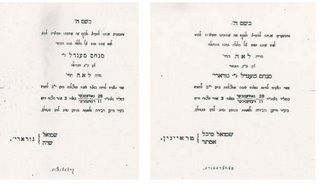
(click to enlarge)
Lekoved 14 Kislev Shturem Continues to analyze wedding invitations. It's a little much if you ask me, after all, is there really a need for 100 different invites? But that's Shia Mondshine for you.
Anyway, Here's an eyecatcher: an invitation to the wedding of Reb Shmuel Gurary's son, Mendel. We see that each side sent an separate invitation with the Kallah's side adding the Gurary's last name when mentioning the Chosson, presumably for effect. Gurary is a better known name, I guess. Besides for the simplicity of the invitation the one thing I noticed, and was not brought in the ensuing analysis was the appearance of a dual "secular" date. November 28th and December 11th. I know as much as that in Russia and in other Eastern Orthodox regions they still follow the old calendar, but only as far as when the Khugges fall out. They don't say that today is December 15th. Was this change made after the fall of the Czar, and until then they went according to the "later" date? Was the dual date only made for OysLand, so that they too should know the Gregorian date?

6 comments:
First of all, there aren't two Gregorian dates, the date is given in both Gregorian and Julian. Russia used the Julian calendar until the revolution. Both families lived in Russia (Kremenchug and Peterburg), but the wedding took place in Vienna (any idea why?), which of course used the Gregorian calendar. Thus the need for two dates, so nobody would get confused.
Count on Milhouse to correct you. Sorry about the terminology confusion there. I did not even notice the wedding being in Wien, I stopped reading after the dates....
Technically, we still use the Julian calendar for our purposes. The Avudraham specifically says we start saying Tal uMatar on November 22 (60 days after September 22, the Fall Equinox) which, as a Julian date, corresponds to December 5 on the Gregorian calendar. In those days there were probably plenty of eastern frummer people who stubbornly stuck with the Julian dates for halachic reasons in addition to force of habit.
OK
here's my dilemna; it's 5674 and I live in Nevel. I get an invitation one day for this wonderful wedding. I look at the invite and see it's in Wien. So I get my passport, go to the train station, and buy a ticket to Wien. I get out at Wien and check the invite for an address, BUT THERE IS NONE! How do I know where to go for the wedding?! Where was it anyway? in the Shulhoff? was that standard procedure in those days?
Camper: In the Avudraham's day the Gregorian calendar had not yet been invented, so everyone in Europe used the Julian, and naturally he gives the date in that. I know of no evidence that Jews in Catholic and Protestant countries were at all reluctant to accept the Gregorian reform when it was introduced by their respective governments. English goyim may have rioted and demanded their eleven days back, but I've never heard that Jews had any problem with it.
After all, there's nothing holy about the Julian calendar, the minhag of beginning Tal Umotor on 21/22 November developed simply because it was easy for anyone to find out when that was, without having to make any calculations. All you had to do was ask a goy for the date. It might have made more sense for Jews to accept the Gregorian reform, drop the 10/11 days, and start saying Tal Umotor on 21/22 November New Style, but that would have meant that Western Jews would be changing on a different day than Eastern Jews, which would destroy the achdus of all chu"l Jews changing on the same day. After all, the whole minhag to follow the climate of Iraq makes no sense anyway; in principle each country should change on its own schedule, but we don't do that because kach nohagu and it's too hard to change it, and it was felt better for everyone to do the same thing even if it's wrong than to create yet another chiluk in minhogim (so why don't we do that with all minhogim?). So ignoring the Gregorian reform doesn't make it much less sensible. All it means is that instead of the date being correct for at least one climate, that of Iraq, it's correct nowhere at all. But since there aren't any Jews left in Iraq anyway, what difference does that make?
(BTW I find it amusing that every Ashkenazi shul still prays every week for the Rabbis of Iraq; right now that would be a handful of US Army chaplains. It's also interesting that Edot Hamizrach don't say that prayer. Personally I substitute vedi vechol asar va'asar, but that's just me.)
There's one other case in which we use the Julian calendar: Whenever the 26th of March falls on a Wednesday in the year after a leap year, we say Birkas Hachamoh; but that's the 26th of March Old Style, which is the 8th of April New Style. The next time this will happen is in 2009.
How to get to the chasunah? My guess is that the mechutonim didn't really expect anyone who got these invitations to actually come, so the exact address didn't matter. Anyone who did plan to accept the invitation could presumably write to them and get the address. Or perhaps they didn't yet have the address when the invitations were printed and sent. Or maybe you're right, and there was only one place in Vienna where yidden ever got married, whether the schulhoff or some other location, so there was no need to specify. (Just as in Crown Heights there are several places where people have wedding receptions, but only one place for a chupah.)
Post a Comment